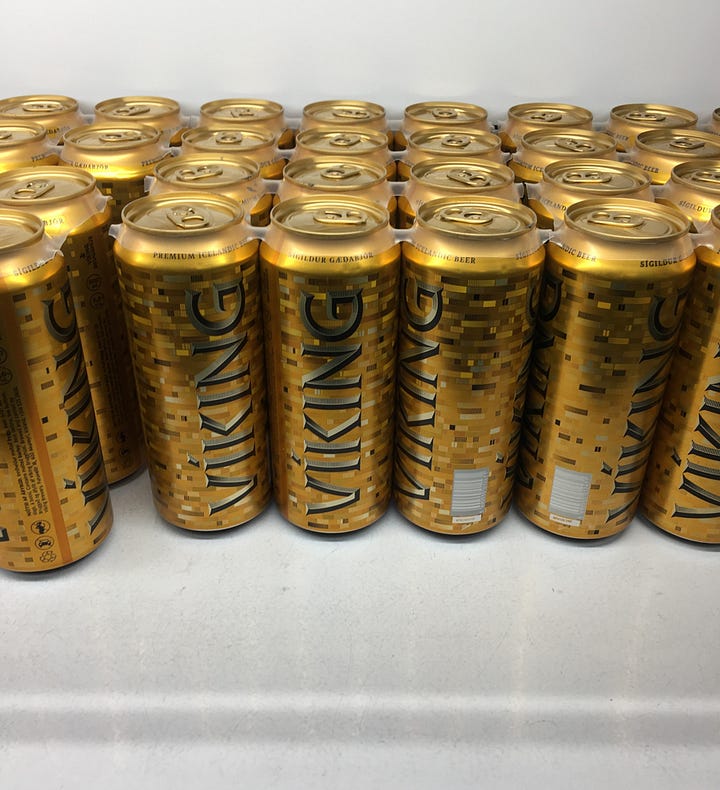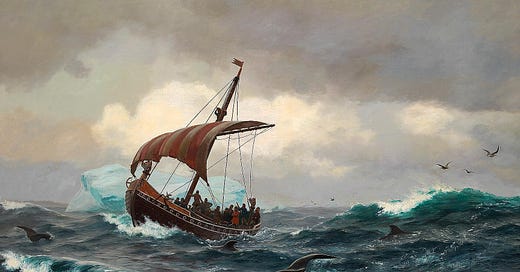If you study the Viking Age for any length of time at all, one thing should become glaringly clear to you: those people wanted to be remembered. The often-quoted poem Hávamál, in which the god Óðinn gives advice, tells it like it is — or was….
Cattle die, and kinsmen die,
And so one dies one's self;
But a noble name will never die,
If good renown one gets.Cattle die, and kinsmen die,
And so one dies one's self;
One thing now that never dies,
The fame of a dead man's deeds.
Be a good person and do great things, and your name will live on forever. Or so they hoped.
Luckily for them their wishes seem to have come true, for our modern fascination with Vikings seems relentless. We are the torch bearers keeping their names alive. And yet, as someone who has spent many years researching and teaching about those intrepid people who lived 1,000 years ago, it sometimes seems odd that we are so enthralled — itself a word that we got from Old Norse — with them still.
To be sure, they were inherently intriguing. They were pre-modern. For a good part of the Viking Age, they were even “pre-historic” in that they were largely an oral culture, not writing anything down except the odd runic inscription on a stone or comb or other personal item. They believed things and lived in ways that are foreign to most of us now, so it makes sense we would find them interesting.
But when you look at the myriad ways they show up in modern culture from movies, television shows, comics, sports mascots, to being used to sell everything from river cruises to hotel rooms, beer, clothing, fish, candy, hot sauce, travel trailers, and more, it seems we have much more than just a passing interest in them.
It feels like we desire a Viking Age 2.0 of sorts. But why?




What does it say about us at this particular point in human history that we find Vikings so special, particularly when we actually know so little about them? Is there something we see in them that we lack?
True Vikings — those marauding seaborne pirates of the Middle Ages — were by most accounts not nice people. They were aggressive and brutally violent. They stole from, maimed, and killed many people, and took others into captivity to work on Scandinavian farms or trafficked them in the many places in their world that engaged in the slave trade. When you read the sagas, you often get a sense of people with “anger issues.”
But they were also human beings with all the complexity that implies. They lived in a time that is beyond imagination for most of us in the modern, developed world, where subsistence life and survival were the only games in town. Rightfully so, in that environment, they were opportunists and did all they could — good, bad, and everything in-between — to better their chances for comfort and a shot at living another day.
In addition to the violence, our sources (archaeological and written) also tell us of people who suffered heartbreak and illness; who liked to have fun but also engaged in squabbles with their neighbors. We hear of wives who nagged their husbands into enacting revenge but who also engaged in their own risk taking like leaving home to settle in a new land. They were strong mentally and physically in a time when not being so was an almost-certain death sentence.
Perhaps it’s these human qualities that draw us in? In the modern West we seem at the same time adrift and out over our skis. We are struggling to be sure. Stressed out, over-extended financially and otherwise, anxious, depressed, isolated, lonely, and chronically ill. If we were transported to the Viking Age most of us wouldn’t survive a week. We are clearly longing for something, and that soup of modern malaise is perhaps just the reason we need another Viking Age — to remind us we are alive and what we’re capable of.
Many scholars who study Vikings, and know as much about them as we possibly can given the evidence, will tell you they don’t want to go back to the Viking Age. They like their modern creature comforts and not having to worry if every little scratch is going to kill them. Fair enough.
Likewise, I have heard some scholars say that they find Vikings interesting, but that does not mean they find them admirable. Yeah, I get it, but I am one of the odd historians who would visit the Viking Age and believe we can find things about them to admire — perhaps some things that we are sorely lacking that could go at least a little ways toward healing what ails us. So, here’s my top reasons for why we need a Viking Age 2.0:
They were more in tune with nature. They had a respect for animate AND inanimate things that we seem to have lost, particularly when talking about the pre-Christian Viking Age. They lived IN the world, not separate from it, as most of us moderns act now. This difference in mindset affects everything from how to deal with a changing climate and how we treat the earth and everything in/on it, to how we farm and feed ourselves. If your ecosystem is sick, you are too. It’s not possible to disrespect nature and think you’ll somehow emerge the victor. As the phrase goes, “Nature Bats Last.”
Vikings knew that.
They valued community. On a basic level, they needed it to survive, but on a deeper level they needed it to live. We are a social species and as much as people can be annoying — even Vikings got pissed at each other quite a bit — we need each other for companionship, love, guidance, support, and comradery. They were people who knew their identity was entirely shaped by those around them, living in a time when community, family, and kin meant everything. None of us is an island; the people we surround ourselves with define who we are and make life worth living.
Vikings knew that.
They believed in responsibility and accountability. Contrary to the lawless barbarian stereotype, Vikings tried very hard to live honorably in accordance with the law. This is the thing about living in a precarious and dangerous time: you need to be able to trust people and take them at their word, so being a liar or oath breaker was a serious offense. Likewise, if people committed crimes or wrongs against others or their property, they were held accountable. They also valued responsibility over dependency. In order to save face and maintain personal honor, you had to step up, pull your own weight, and contribute to the community. They also did not like vagrancy or any other form of not taking responsibility for your family and kin. Functioning societies cannot exist when people shirk their responsibilities and blame others for their problems.
Vikings knew that.
They lived shorter lives. Okay, that probably doesn’t sound like such a plus, but all the evidence points to a Viking culture that was interested in packing as much as possible into that short life span. They had a real carpe diem attitude owing to their ideas about fate. So many of us in the modern world live in paralyzing fear of you-name-it: illness, injury, judgment, risk, loss, failure….life. But cowering and anxious is no way to spend the gift of life you’ve been given. I actually think part of our problem is that we desperately want to feel alive but don’t know how to anymore, and we need to figure it out and remember. What’s the point of sitting home on the couch if life is short? If nothing is ventured, then nothing is gained.
Vikings knew that.
Those are my thoughts, and I know I could be accused of cherry picking here. But in my defense, I firmly believe that you can’t throw the baby out with the bathwater. Vikings were neither all good nor all bad. And obviously I’m not suggesting, nor would I ever, that we need a new Viking Age because we need to return to the bad ole days of violence and pillaging. But many of the modern challenges we face have very fundamental concepts at their root. If living the Viking way means respecting nature, realizing we are part of a human community instead of being isolated individuals, taking responsibility for our actions, and packing in as much excitement, adventure, and life as we can, it will make this short ride all the more worth it.
Viking Age 2.0? Sign me up.







Wow that was really interesting.
Our election period has shown that we have many deficits and as a child I was more viking like than most around me. I enjoyed it far more that way and many people say I was a pioneer. Many think they are all that and it is often because they inherited a life that others lived and they do k
not really know what it is to be responsible. . .they simply have shifted to the government as parents and do not really grow up at all.